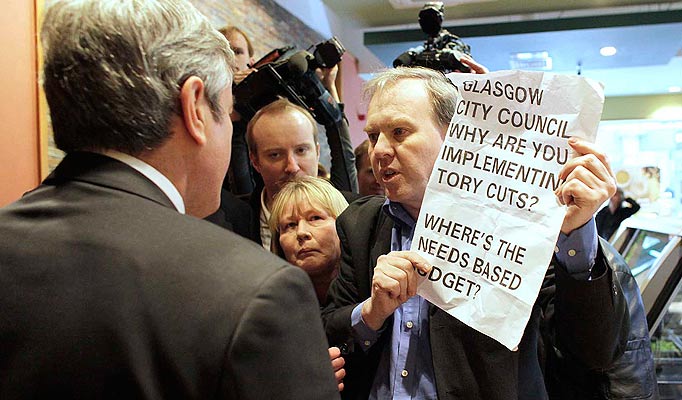
The defining moment of the Scottish election, supporters of the Save the Accord Centre campaign confronting Labour Leader, Ian Gray. Glasgow 7 April 2011
On 5 May the Labour Party suffered a major defeat in the elections to the devolved Scottish parliament in Edinburgh, as the Scottish Nationalist Party (SNP) swept to the first overall majority in the Parliament since its inception in 1999. The election saw the SNP make significant gains in the traditional Labour heartlands in Lanarkshire and Glasgow. The dismal results for the left outside the Labour Party confirmed the political standpoint of Fight Racism! Fight Imperialism! – the need for socialists to make an explicit anti-Labour position central to the rebuilding of the socialist movement.
The SNP now has 69 members of the Scottish parliament (MSPs), up 22 from the 2007 election. 53 SNP MSPs were elected from the constituencies compared to only 15 Labour MSPs. In the end Labour had a total of 37 MSPs. Turnout in the election stood at 50%. Scotland has long been a Labour bedrock. At last year’s Scottish Labour Party conference Ed Miliband declared that ‘Labour’s fight has begun in Scotland’, stating that the Scottish election would be a ‘vital moment’ in rebuilding Labour’s fortunes following its UK election defeat in 2010. Today the Scottish Labour Party is in complete disarray, with its leader Ian Gray, himself returned with a majority of only 151, announcing he will step down as party leader in the autumn. Some of Scotland’s leading Labour lights have lost the jobs they arrogantly assumed they would have for life, most notably former ministers Andy Kerr, Frank McAvetty and Tom McCabe.
Public spending in Scotland in the devolved areas of health and education has been between 10% and 15% more per head than in England. Despite this, parts of Scotland have high levels of morbidity, mortality and long term youth unemployment – as bad as anywhere in Europe. Men in Scotland can expect to live 13 years longer on average in affluent areas than those in working class areas. The first seven years of the Scottish Parliament saw an increase to the block grant to the Scottish government of more than 50% in real terms. This allowed the SNP minority government elected in 2007 to implement policies different from the rest of the UK: free university tuition, increased spending on health, abolition of prescription charges, a freeze on council tax payments, and free transport for the elderly. These represented significant material gains for large sections of society and encouraged those defecting from the Liberals to rally behind the SNP rather than Labour, which could offer no coherent alternative.
Scotland has a unique electoral system, in which the electorate has two votes – one for a constituency MS and the second for candidates on a regional list. It is this mechanism which allowed the Scottish Socialist Party to avoid opposing Labour and have six MSPs elected in 2003, receiving 128,026 (7.7%) of the vote. This year the left once again concentrated its efforts on the regional list to avoid embarrassing constituency humiliations. Despite this, it was annihilated. The SSP polled 8,272 votes (0.4%) across Scotland, while its rivals in Solidarity received 2,837 (0.1%). The Socialist Labour Party, which scarcely exists on the ground, received 16,847 votes (0.8%). It fell to George Galloway, standing on behalf of the Respect Party, to lead the charge of the left on the Glasgow regional list, with the backing of both Solidarity and the Socialist Workers Party. Galloway’s strategy was to attack the SNP while calling on voters give him their second vote. He openly backed the now-ousted Labour MSP Pauline McNeil and declared that if elected he would support a Labour coalition. In the event, he managed just 6,972 votes (3.3%) from across Glasgow, far short of the required 5% which would have been necessary to see him elected from the list. Galloway had tied his fortunes to Labour in the age-old tradition of the opportunist left only to find himself going down with the sinking ship.
Trouble lies ahead. Scotland’s two main banks have already collapsed – The Royal Bank of Scotland and the Bank of Scotland. The SNP majority government will be at the forefront of passing on and implementing cuts as the block grant from Westminster is squeezed. The severe cuts which have swept across England have yet to be felt in Scotland as the outgoing SNP government postponed such measures until after the election. The fight to defend living standards will escalate as the cut-backs begin to be felt across Scotland. Those who will be forced into battle will have to fight on all fronts: against the Con-Dem coalition at Westminster, the SNP government in Edinburgh, and the Labour-controlled councils implementing cuts. The battle is about to start.
Paul Mallon




